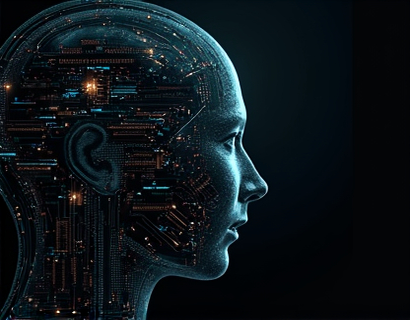Unlocking Enhanced Digital Experiences Through the Synergy of Crypto and AI
The intersection of cryptocurrency and artificial intelligence (AI) is giving rise to a new era of digital innovation, where the boundaries of traditional technology are being redefined. This merging of two revolutionary fields is not only transforming how we interact with digital platforms but also driving unprecedented growth in the tech sector. As tech enthusiasts and professionals, understanding the dynamics and potential of this synergy is crucial for staying ahead in the rapidly evolving digital landscape.
The integration of AI into cryptocurrency systems has opened up a myriad of possibilities, from enhancing security and transaction efficiency to creating more intuitive and personalized user experiences. This article delves into the latest innovations at the forefront of this convergence, exploring how these advanced technologies are reshaping digital interactions and fostering a more connected and efficient tech ecosystem.
Enhanced Security Through AI-Driven Cryptography
One of the most significant benefits of combining AI with cryptocurrency is the enhancement of security measures. Traditional cryptographic methods, while robust, are increasingly being challenged by sophisticated cyber threats. AI brings a dynamic and adaptive approach to cryptography, enabling the development of more resilient security protocols.
Machine learning algorithms can analyze vast amounts of data to identify patterns and anomalies that may indicate a security breach. These algorithms can continuously learn and adapt, improving their ability to detect and mitigate threats in real-time. For instance, AI-powered systems can monitor blockchain transactions for unusual activity, flagging potential fraud before it occurs. This proactive approach to security not only protects users' assets but also builds trust in cryptocurrency as a reliable and secure form of digital currency.
Optimized Transaction Processing with AI
Transaction processing is another area where AI is making a substantial impact. Traditional blockchain networks often face issues with scalability and transaction speed, which can hinder their widespread adoption. AI technologies, particularly those involving neural networks and deep learning, are being employed to optimize transaction processing.
By analyzing historical transaction data, AI can predict and manage network congestion, ensuring smoother and faster transaction processing. Smart contracts, which are self-executing contracts with the terms directly written into code, can also benefit from AI. AI can automate the execution of these contracts based on predefined conditions, reducing the need for intermediaries and lowering transaction costs. This not only speeds up the process but also enhances the overall efficiency of the cryptocurrency ecosystem.
Personalized User Experiences Through AI
The user experience in the crypto space is being significantly enhanced through AI-driven personalization. Just as streaming services and e-commerce platforms use AI to recommend content and products based on user behavior, cryptocurrency platforms are leveraging AI to provide tailored experiences to users.
AI algorithms can analyze user interactions, preferences, and transaction history to offer personalized recommendations for investments, wallet management, and other services. For example, a crypto wallet app powered by AI can suggest optimal times for buying or selling cryptocurrencies based on market trends and the user's risk profile. This level of personalization not only improves user satisfaction but also encourages greater engagement with the platform.
AI-Powered Chatbots and Customer Support
Customer support is a critical aspect of any digital service, and AI is revolutionizing how support is delivered in the crypto space. AI-powered chatbots can provide instant and accurate assistance to users, handling a wide range of queries from account management to technical issues.
These chatbots use natural language processing (NLP) to understand and respond to user queries in a human-like manner. By integrating with blockchain and cryptocurrency APIs, chatbots can access real-time data to provide up-to-date information and solutions. This not only enhances the user experience but also reduces the workload on human support teams, allowing them to focus on more complex issues.
Decentralized AI and the Future of Crypto
The concept of decentralized AI is gaining traction within the cryptocurrency community, promising to further enhance the synergy between these two technologies. Decentralized AI involves distributing AI computations and data across a network of nodes, rather than relying on centralized servers. This approach aligns well with the decentralized nature of blockchain technology.
Decentralized AI can improve data privacy and security, as sensitive information is not stored in a single location. It also enhances the robustness of AI models by leveraging a diverse set of data sources and computational resources. In the context of cryptocurrency, decentralized AI can be used to develop more transparent and trustless systems for tasks such as consensus mechanisms and data validation.
AI-Enhanced Predictive Analytics
Predictive analytics is a powerful tool for making informed decisions in the crypto market. By combining AI with blockchain data, it is possible to create highly accurate predictive models that can forecast market trends, price movements, and other key indicators.
AI algorithms can process and analyze vast amounts of data from various sources, including historical price data, news articles, social media sentiment, and economic indicators. This comprehensive analysis enables the identification of patterns and correlations that may not be apparent through traditional methods. Traders and investors can use these insights to make more informed decisions, potentially leading to better investment outcomes.
Challenges and Considerations
While the integration of AI and cryptocurrency offers numerous benefits, it also presents several challenges that need to be addressed. One of the primary concerns is the regulatory landscape. As both AI and cryptocurrency are relatively new and rapidly evolving fields, regulatory frameworks are still catching up. Ensuring compliance with existing laws and advocating for clear and supportive regulations is crucial for the sustainable growth of this synergy.
Another challenge is the technical complexity involved in integrating AI with blockchain systems. Developing scalable and efficient AI solutions that can operate within the constraints of blockchain technology requires expertise in both domains. Collaboration between AI researchers, blockchain developers, and industry experts is essential to overcome these technical hurdles.
Ethical Considerations
Ethics play a vital role in the development and deployment of AI in the crypto space. Issues such as data privacy, algorithmic bias, and the potential for misuse of AI technologies must be carefully considered. Transparent and ethical AI practices are necessary to build trust and ensure that the benefits of this synergy are realized without compromising ethical standards.
Moreover, the environmental impact of AI and blockchain technologies cannot be ignored. The energy consumption associated with training AI models and maintaining blockchain networks is a significant concern. Exploring more sustainable practices, such as using renewable energy sources and developing energy-efficient algorithms, is essential for the long-term viability of these technologies.
Conclusion
The convergence of cryptocurrency and AI is paving the way for a new era of digital innovation, characterized by enhanced security, optimized transaction processing, and personalized user experiences. As these technologies continue to evolve, their potential to transform the tech sector and beyond is immense. For tech enthusiasts and professionals, staying informed about the latest advancements in this space is key to harnessing the full potential of this exciting synergy.










































